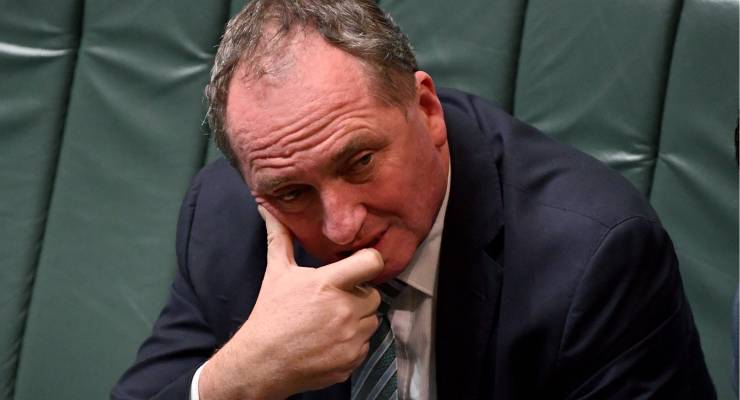
In deciding the fate of Barnaby Joyce’s leadership, a consideration that Nationals MPs will supposedly have to factor in is the electoral advantage conferred by Joyce’s mastery of something called “retail politics”.
Part of the proof is said to lie in the party’s performance under Joyce’s leadership at the 2016 election, which Joyce says was won only because his party “didn’t go backwards — we actually went forwards”.
This refrain has been widely echoed through Joyce’s recent travails, including by News Corp columnist Tim Blair, who noted the Nationals had “marginally increased their vote and picked up an extra representative in the lower house”, even as the government was brought to the brink of defeat by the loss of thirteen Liberal-held seats.
However, a deeper look at the numbers casts doubt over Joyce’s self-image as the saviour of the government’s bacon.
While there would not have been much in it either way, the Nationals’ vote would not have increased if the party had not contested seats in Victoria that it forfeited in 2013.
Chief among these was Murray, the seat that the gave the party its extra representative: Damian Drum, who has been a bit player in the events of the past fortnight.
Since this seat was gained from the Liberals, the result contributed nothing to the survival of the government, and more likely reflected Drum’s personal vote after a long career in state politics than any electoral magic on Joyce’s part.
While it’s true that the Coalition casualty list at the 2016 election was an all-Liberal affair, it must be remembered that losing seats is much harder work for the Nationals than it is for the Liberals, whose job it is to defend the electorally volatile mortgage belts.
In New South Wales, six of the nine seats that the Nationals have been free to contest under coalition agreements over the past decade are more-or-less safe for the party, while another two have been consistently held by Labor.
This means the difference between a good election and a bad election essentially comes down to the marginal seat of Page on the state’s North Coast — and it is indeed to the Nationals’ credit that this seat was retained in 2016.
However, the average result across the nine seats was a swing to Labor of around 3%, which was hardly different from a 4% average recorded in the remaining thirty-eight.
The situation in Queensland is complicated by the parties’ shared branding as the Liberal National Party, but the average 4.3% swing to Labor in seats contested by Nationals-aligned candidates was actually higher than the 2.5% average in seats reserved to the Liberals.
None of this is to deny that Joyce has, or had, considerable personal appeal in the Nationals heartland, as demonstrated by his extraordinary performance at the New England byelection in December — despite his constituents being, by all accounts, fully appraised of his marital strife through the bush telegraph.
But beyond the confines of his own seat, the 2016 result illustrates the point that country voters, no less than city ones, are primarily guided by the party they would prefer to form government, and hence little concerned with the identity of the Nationals leader.
That means the Nationals party room, if it knows what’s good for it, will be focused on the government’s need for unity and clarity of purpose — things it has little chance of attaining while the Barnaby Joyce soap opera plays out in daily episodes on tabloid front pages and breakfast television.








GORN!!!
The seat of Murray was held by John McEwan for decades. His successor was also National. On his retirement, the Liberals put up a better candidate, and won the open seat. Thus the Nationals would not have fielded a candidate for some years. When the seat became vacant the Nationals had a superior candidate in Damien Drum, and the seat reverted to them. Drum was an upper house member of the Victorian parliament before transferring to Canberra. He was also a well-known sportsman, playing for Geelong and coaching at AFL level.
I have always wondered about the term ‘best retail politician’. Retail? – does this mean he’s for sale? Surely not. It must mean he can sell the goods. But the looseness of the term makes me wonder if someone’s having a lend of us.
Given the changing demographic of New England, Tamworth, the uni in Armidale, a substantial and increasing influx of tree changers – cashed up from fleeing those ‘orrid ‘arbour views – and not thrilled by the prospect of another gNat, this electorate is as good a test bed as any for a truly environmentally aware representative.
Soon.
The seat of Page was won by the Nationals spending a lot more money than Labor or the Greens spent. This was not the only factor. The boundaries of the electorate were extended so gerrymandering was also involved.
Former Labor MP for Page Janelle Saffin had really raised the bar from the perspective of infrastructure investment. The current Nats MP for Page Kevin Hogan has followed in her footsteps doing all the things Nats do these days, after decades of neglect – rebuild country bridges, roads, hospitals and invest in Catholic education primarily.
Page needs investment in Renewable Energy, clean public transport to connect its towns and villages to coastal centres, and its farming and town communities need to begin cleaning up their act so the rivers can become healthy again. The rivers of the Page electorate are the most polluted in NSW.